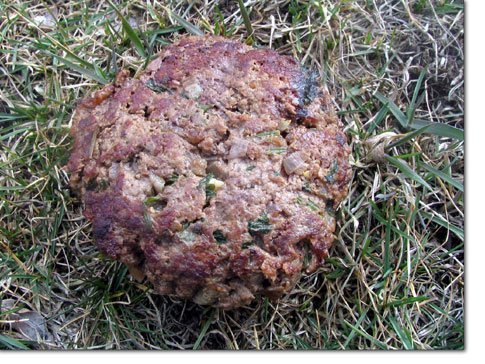|
| ||
| His poop don't stink
by Chef Boy Ari When a Washington cow tested positive for mad cow disease in 2003, you could almost smell the collective burger breath as the nation gasped in horror. But when the third U.S. case was reported last week in Alabama (the second was found in Texas in 2004), the media barely batted an eye, and Americans kept on chewing. USA Today mentioned the incident on page 9. New York Times: page 19. Los Angeles Times: page 17. One exception is the Wall Street Journal, which, with its focus on the financial bottom line, gave the story front-page treatment. Meanwhile, the USDA is planning to downscale its mad cow disease screening program, which currently tests less than 2 percent of slaughtered cattle. The 2007 budget will allow for screening of 40,000 cattle per year, about one-10th of 1 percent of those slaughtered annually in the United States. Defending our soon-to-be-relaxed domestic screening program, USDA Chief Veterinary Medical Officer John Clifford explained that the incidence of Mad Cow Disease “remains extremely low and our interlocking safeguards are working to protect both human and animal health, and we remain very confident in the safety of U.S. beef.” So confident, evidently, that the USDA won’t even allow individual slaughterhouses to test for mad cow disease independently. Mad cow disease, aka bovine spongiform encephalopathy (BSE), and its human form, variant Creutzfeldt-Jakob disease, are caused by a type of abnormally shaped protein called a prion. Not alive like a bacteria, nor possessing genetic material like a virus, prions can nonetheless replicate. The BSE prions coat nerve cells and turn the brain into a sponge. What’s perhaps most scary about these prions is that they can survive extreme efforts to destroy them, like high heat, harsh chemicals and other treatments that kill viruses and bacteria. This was a point driven home by Howard Lyman, an ex-cattleman cum “hardcore vegan,” at his talk in Missoula, Mont., last week. “There’s no one here who has eaten as much meat as me,” Lyman promised the crowd. The last time Lyman ate meat was roughly 10 years ago, near his April 1996, appearance on “The Oprah Winfrey Show,” when mad cow disease was making headlines in Britain. When Lyman explained how cow products are routinely fed to other cows, Oprah exclaimed she’d never eat another hamburger. The next day, beef futures tanked. Shortly afterward, Lyman and Oprah found themselves codefendants in a libel suit brought by Texas ranchers. In Amarillo, Texas, the suit was dismissed for good in 2002. Since then, Lyman has been traveling and speaking about confinement livestock operations, which he believes will continue to create weird and dangerous diseases. “You can’t destroy the prion that causes mad cow disease,” he said. “You can’t clean it off your tools. That’s why nobody wants to do an autopsy on a suspected Creutzfeldt-Jakob disease victim. In England they have entirely separate facilities for dealing with CJD.” While the practice of forcing cannibalism upon our livestock is now illegal, things remain quite weird in the barnyard. For instance: Chicken excrement constitutes a significant portion of the diet of feedlot cattle because of its high protein content. This, according to Lyman, raises concerns about other diseases, such as avian flu, which he calls a greater threat than mad cow disease. “Why does the flu break a few weeks after Thanksgiving?” he asked the crowd. “Because influenza originally came from birds!” More people died in the flu outbreak of 1918, he says, than died in World War I, and if the avian flu were to mutate enough to be transmissible from one human to another, there could be a catastrophic outbreak. While Lyman likes mentioning his “hard-core vegan” diet and citing examples of extreme health turnarounds credited to a diet sans animal products, he seems just as concerned about protein and fat, which we eat too much of, he says. Meanwhile, most of us don’t eat enough fiber. To the meat eaters, he says, unless you know for sure it never lived in confinement, don’t eat it. Avoiding sugars and other simple carbohydrates, Lyman gets his energy from the complex carbohydrates of minimally processed vegetable sources. “Does your poop float or sink?” he asked the room, cryptically. Some in the room chuckled. Others like me, didn’t quite get it. The next day, via telephone, I got it. Some kind of inside joke among vegetarians, I think, whose poop, he says, is higher in fiber, and floats, while meaty poop sinks. Either way, don’t feed it to the animals you eat – that stinks. •
|


